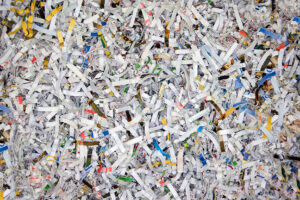Medical waste is generated by healthcare facilities on a daily basis, and it includes anything from used syringes to infectious waste. Proper disposal of medical waste is critical to protect the environment and prevent harm to human health. But where does medical waste go after disposal? In this blog, we will answer the question, “Does medical waste go into the landfill?”
The answer is, it depends on the type of medical waste. Some medical waste can be disposed of in a landfill, while others require specialized treatment and disposal. The following are some examples of medical waste that can and cannot go into a landfill:
Medical Waste That Can Go into a Landfill:
- Non-hazardous Waste: Non-hazardous medical waste includes items such as paper, plastic, and food waste that are not contaminated with blood or other infectious materials. This type of waste can go into a landfill as regular municipal waste.
- Some hazardous waste: Some hazardous medical waste, such as chemotherapy waste, can go into a landfill if it is properly packaged and labeled. This type of waste requires special handling and packaging to ensure that it does not pose a risk to human health or the environment.
- Some treated medical waste: advancements have been made in recent years, bringing innovated technology such as the TE-5000 sterilization device to the healthcare market. Practices across all specialties including Dermatology, Long-term Care, ASCs, Community Health Centers, and Physician Offices trust the TE-5000 to sterilize their Sharps and other small-quantities of bio-hazardous waste. Once a processing cycle is complete, the treated waste is deemed sterile and allowed to be thrown in with the regular landfilled waste (Regulations vary; contact OnSite to confirm approval.
Medical Waste That Cannot Go Into a Landfill:
- Infectious Waste: Infectious waste includes items such as used needles, blood-soaked materials, and bodily fluids that can transmit infectious diseases. This type of waste cannot go into a landfill and must be treated and disposed of in a specialized medical waste treatment facility.
- Pharmaceutical Waste: Pharmaceutical waste includes expired or unused medications that can be harmful if they end up in the wrong hands or pollute water sources. This type of waste cannot go into a landfill and must be disposed of through proper channels, such as take-back programs or incineration.
- Sharps Waste: Sharps waste includes items such as needles, syringes, and lancets that can puncture the skin and cause injury or infection. This type of waste cannot go into a landfill and must be treated and disposed of in a specialized medical waste treatment facility.
Regulations for Medical Waste Disposal:
Healthcare facilities must follow federal, state, and local regulations for the disposal of medical waste. The Environmental Protection Agency (EPA) provides guidelines for the management of medical waste, including requirements for packaging, labeling, and transportation of waste. Improper disposal of medical waste can result in significant penalties and legal consequences. Facilities must also ensure that they are properly labeling and packaging their medical waste to prevent contamination.
Conclusion:
In summary, some medical waste can go into a landfill, while others require specialized treatment and disposal. Infectious waste, pharmaceutical waste, and sharps waste cannot go into a landfill and must be treated and disposed of in a specialized medical waste treatment facility. Healthcare facilities must follow federal, state, and local regulations for the disposal of medical waste to protect the environment and prevent harm to human health.
At OnSite Waste Technologies, we are committed to helping healthcare facilities reduce their medical waste output and comply with regulations. Our innovative waste treatment solutions, such as the TE-5000, can help healthcare facilities safely dispose of medical waste on-site, reduce their carbon footprint, and minimize their regulatory risk. Contact us today to learn more and to explore new and innovative ways to reduce medical waste.
Sources:
- Medical Waste Management Regulations: https://www.epa.gov/rcra/medical-waste-management
- Examples of Improper Medical Waste Disposal: https://www.cdc.gov/infectioncontrol/guidelines/disinfection/sterilization/medical-waste.html










